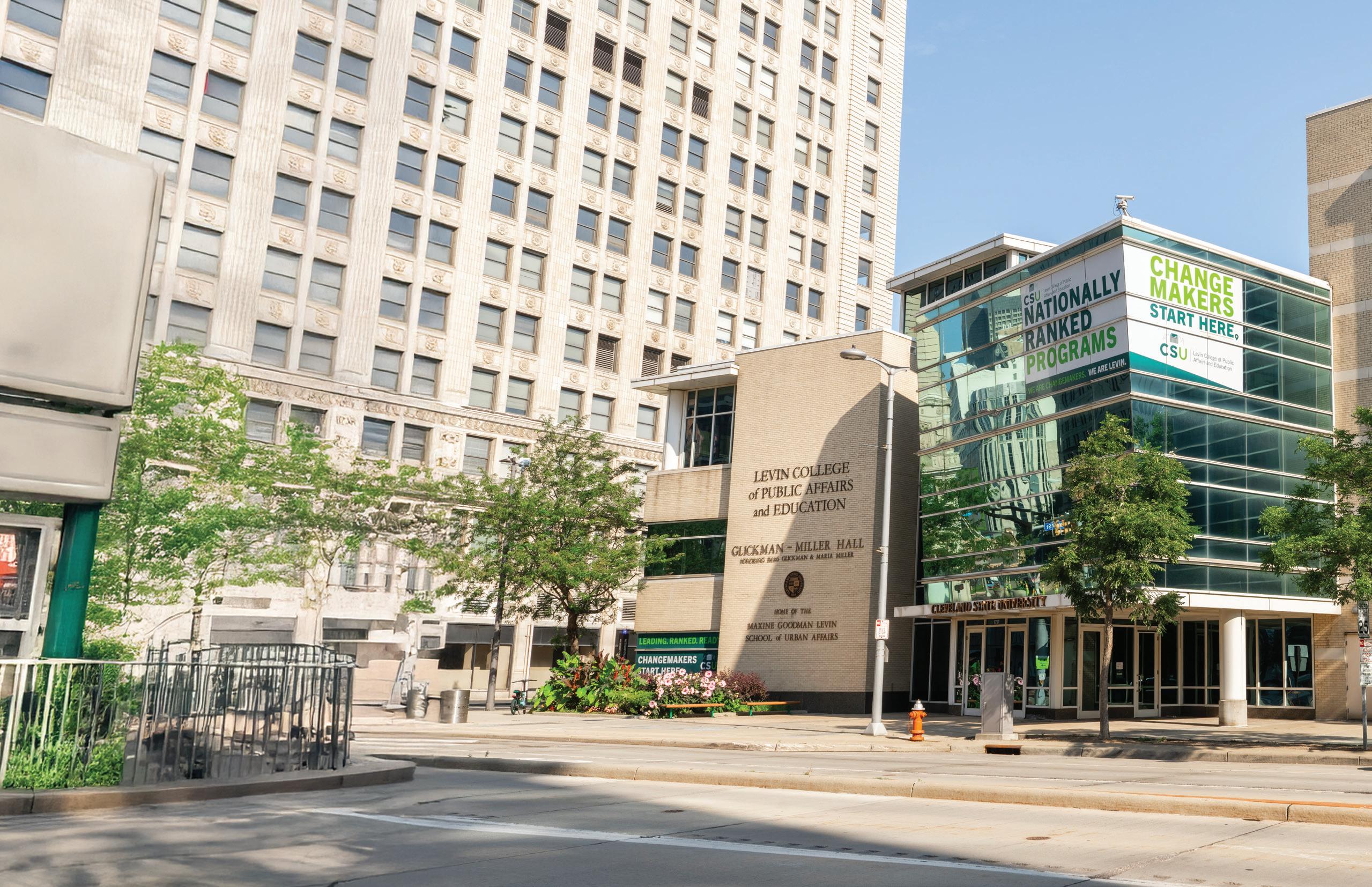LEVIN LEADS

LEVIN ROOTS, CITYWIDE REACH: 20 YEARS of POLICYBRIDGE IMPACT

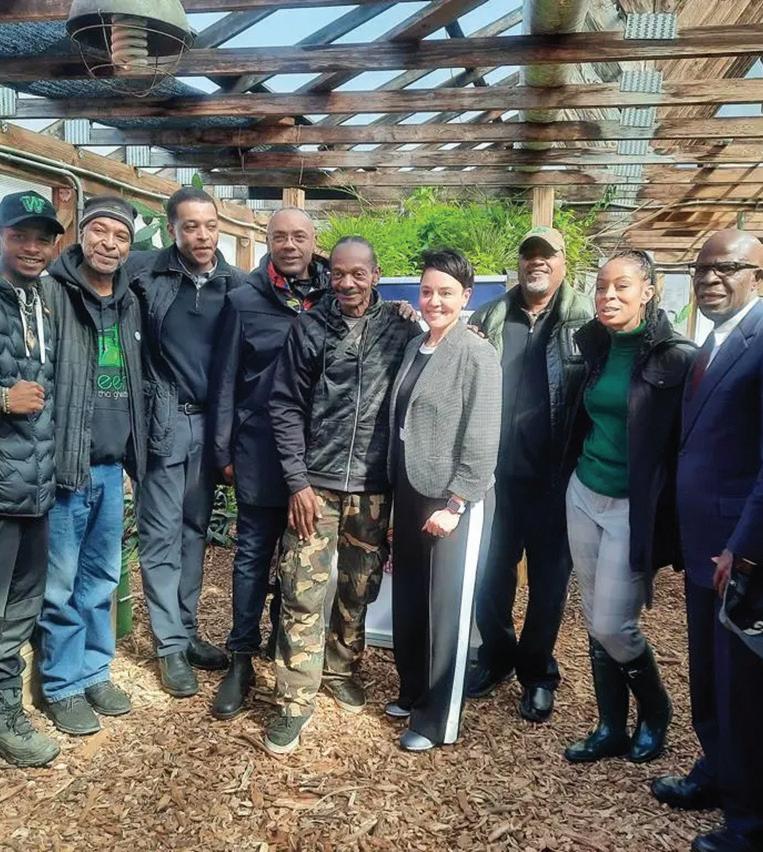




LEVIN ROOTS, CITYWIDE REACH: 20 YEARS of POLICYBRIDGE IMPACT




Mailing Address Cleveland
Jill A. Gordon, Ph.D. Dean and Professor
Contributing Writers Armond Budish Kara Keating Copeland David Kich
Contact Us
Please send alumni news, story ideas, death notices and other comments to levincollege@csuohio.edu.
Dear Friends,
Welcome to the latest issue of Levin Leads where you will discover how our alumni, students, staff, and faculty are driving meaningful policy change, enriching lives across our communities, and shaping the next generation of public impact leaders.
At Levin College, we take pride in being rooted in the heart of Cleveland—a city whose energy, resilience, and communities inspire and shape everything we do. Our location gives us a unique opportunity to connect students with real challenges and meaningful engagement, while our faculty and alumni bring expertise and leadership that turn those opportunities into lasting impact. Together, we are building a learning environment where access, connection, and the common good are at the center.
In this issue, you’ll find stories that capture the spirit and impact of Levin College in action. Levinspiration highlights the journey of Randell McShepard and PolicyBridge—an influential “think and action tank” first mapped out in Levin’s hallways when its founders were graduate students. Levinsight showcases our innovative pathway program linking the Ohio Certified Public Manager Program with our academic degrees, strengthening the pipeline for Ohio’s next generation of public servants. Each story reflects how Levin continues to serve as a catalyst for ideas, partnerships, and lasting impact.
What drives our work at Levin College is the success of our students. Your support plays a vital role in making these transformative experiences possible. Thank you for investing in our students’ journeys and helping ensure they are prepared to lead with purpose and create lasting impact for years to come.

With gratitude,
Jill Gordon DEAN
Levin College of Public Affairs and Education
Cleveland State University



The study, commissioned by the County’s Department of Housing and Community Development, identified urgent challenges: housing affordability, aging infrastructure, rental market instability, a shortage of habitable homes, and the need for advocacy-informed approaches.
“We know that safe, stable housing is the foundation for families and communities,” Ronayne said. “This study affirms the challenges we’ve heard directly from residents, housing advocates, and local leaders. We will use this data to strategically invest in the housing solutions our communities need.”
The County’s plans include:
• A $1 million revolving loan fund for affordable single-family construction.
• $500,000 for critical rental property repairs.
• $50,000 for enhanced housing data tracking.
• Partnerships with suburban communities to create tailored housing plans.
“This work reinforces our belief that housing is not a standalone issue. It’s connected to health, education, safety, and opportunity,” said Sara Parks Jackson, Former Director of the Cuyahoga County Office of Housing and Community Development. “We’re focused on increasing the supply of quality, affordable homes and equipping our communities with the tools to sustain them.”
The study was led by Molly Schnoke, Director of Levin’s Center for Economic Development. With nearly two decades at the College, Schnoke has advanced major regional initiatives in housing, competitiveness, and community development.
“This is a critical step forward for Cuyahoga County. This report shows how coordination, smart policy, and thoughtful investment can move us toward lasting solutions,” said Molly Schnoke. “The County is not just listening; they’re committing real resources to the work of change.”
The housing study is just one example of the Center’s urban policy impact. In collaboration with regional partners, it launched the Waterfront
When County Executive Chris Ronayne (MUPD ’97) announced a $1 million affordable housing loan program, the initiative drew on research from his alma mater. The Countywide Housing Study—led by the Levin College of Public Affairs and Education’s Center for Economic Development—provided the evidence base for these proposals. The Center has partnered with Cuyahoga County on housing research for years, producing data and insights that inform policy and planning across multiple administrations.
Mapping Tool, an interactive platform tracking development along Cleveland’s lakefront and the Cuyahoga River. The tool supports projects like the North Coast Master Plan, Irishtown Bend, and the Rock & Roll Hall of Fame expansion—giving planners, developers, and residents a clear picture of how the city is evolving.
Levin research continues to shape Northeast Ohio’s future, providing the data that drives smart decisions in housing, infrastructure, and economic development.
Scan to learn more about the Waterfront Mapping tool.
Watch the news conference “Cuyahoga County Housing Study Sets Path Forward.”
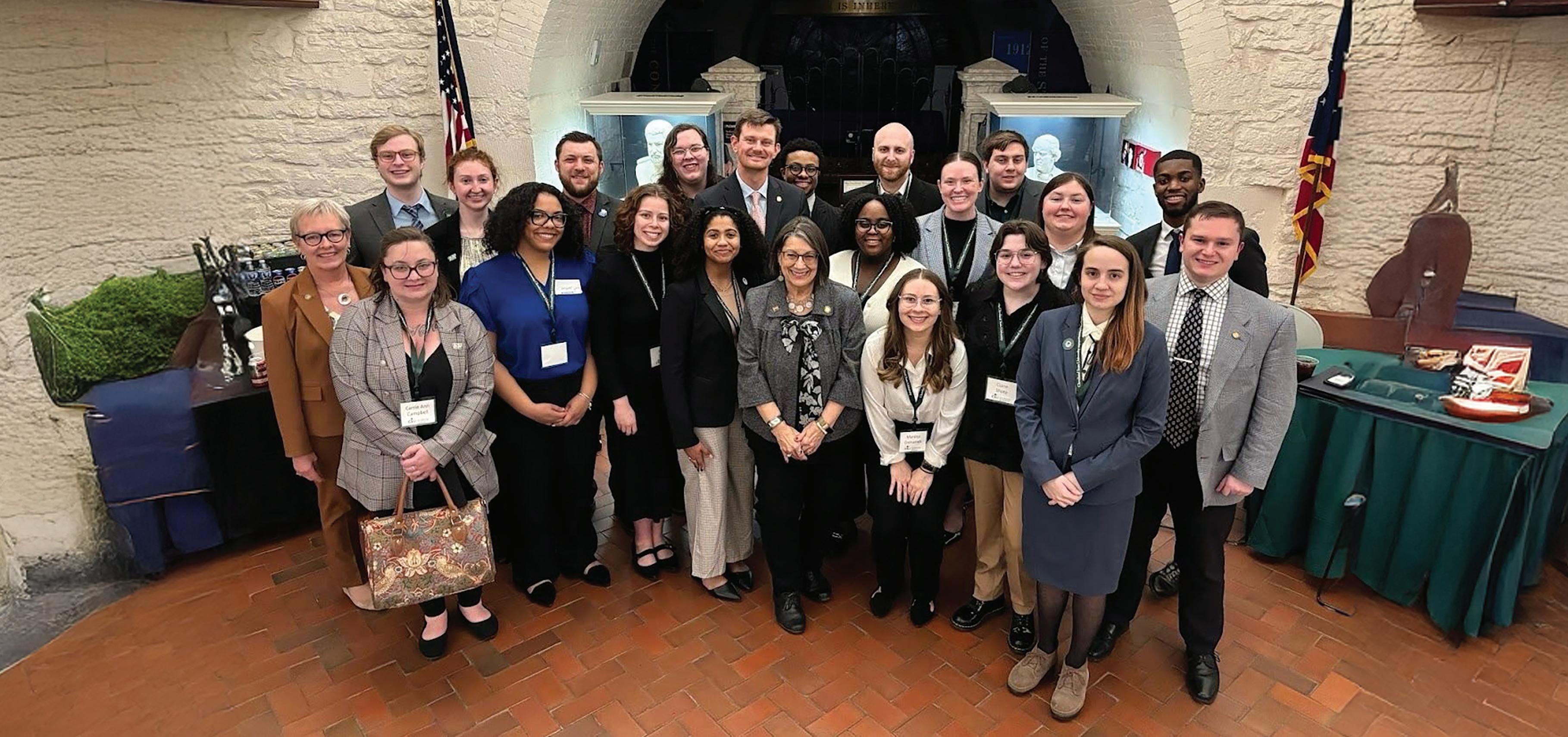
Every spring, students from the Levin College of Public Affairs and Education leave the classroom behind and head down I-71 to the Ohio Statehouse. During spring break, they immerse themselves in policymaking, meet with leaders, and witness firsthand how state-level decisions shape communities. This experience equips them with the skills, insights, and networks to become the next generation of public changemakers.
The 2025 cohort of 18 students continued the Columbus Seminar tradition, spending the week engaging with policymakers, networking with professionals, and experiencing the fast-paced world of state politics in ways that textbooks alone could never provide.
Students met with members of the General Assembly, legislative staff, the Governor’s Office, executive agencies, nonprofits, lobbyists, media, and policy experts to gain a deeper understanding of how government decisions impact the lives of Ohioans. Meetings with the Office of Budget and Management, the Legislative Service Commission, and the Ohio Department of Higher Education offered students practical insight into the mechanics of policy and governance.
The Ohio Statehouse is alive with Levin alumni making an impact, and students got to see why. As part of the seminar, they shadowed legislators, attended committee hearings, and visited alumni leaders, including Ohio Senate Minority Leader Nickie Antonio (MPA ’92) and Representative Tristan Rader (MPA ’15), both former seminar participants. Years ago, these alumni walked the halls as students; now they guide the next generation in navigating policymaking, asking questions, and seeing public service in action.
Associate Professor Meg Rubado, Ph.D., of the Maxine Goodman Levin School of Urban Affairs, helped guide the transformative week. Her leadership ensures students not only gain access to the highest levels of state government but also develop the confidence and connections to pursue careers in public service.
“The Columbus Seminar would not be the transformative experience it is without the generosity of the many public officials, nonprofit leaders, and professionals who take the time to engage with our students,” Rubado said. “Their willingness to share insights, answer questions, and offer guidance creates an unmatched learning experience.
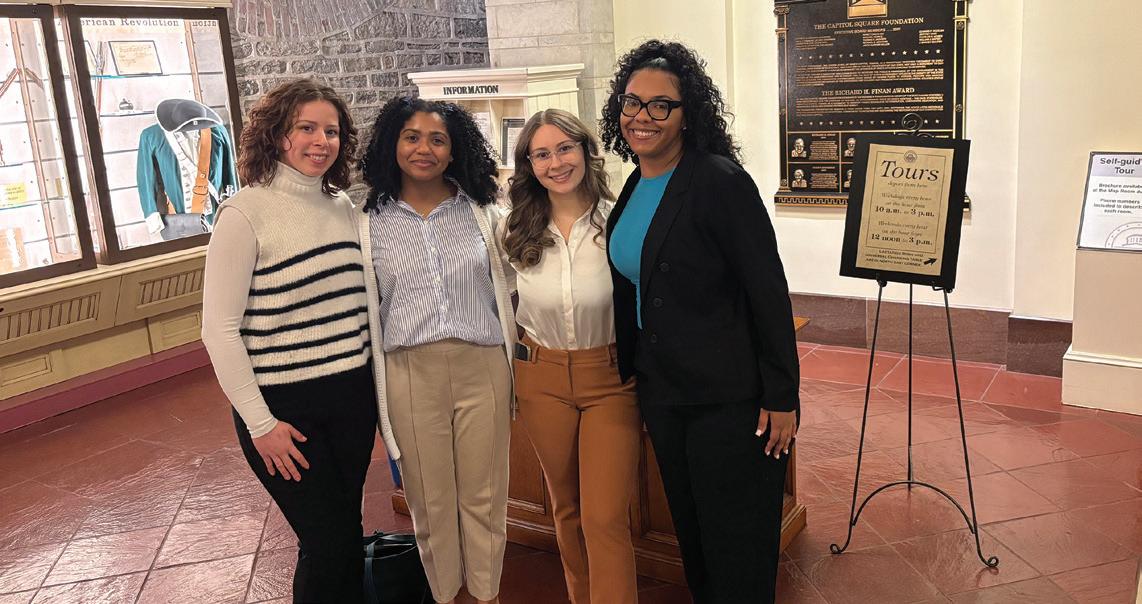
“It was life-changing,” said Katura Pleasant (MPA ’25) of the seminar experience. “I was.... I was able to sit in on a Supreme Court of Ohio oral argument, Ohio House Committee hearings, and opponent testimony for SB1. I connected with Levin alumni in Columbus and saw firsthand the opportunities my degree can offer. My time at Levin has been phenomenal.”
Through hands-on learning, meaningful exposure, and connections with alumni leaders, the Columbus Seminar continues to prepare Levin College students to become informed, engaged changemakers, ready to step into public service and make a real difference in their communities.
The Columbus Seminar is now accepting applications for our 2026 cohort. Alumni and partners are invited to connect with our students during the Legislative Reception. Learn more here.

“This summer I went to Greece… and then to Washington, D.C. I collaborated on international research in artificial intelligence (AI), taught university students, explored ancient fortresses, and helped advocate for special education policy on Capitol Hill. Along the way, I saw a lot of marble columns, from ancient temples in Athens to the halls of Congress.”
In Greece, Hughes served as a Fulbright Scholar, partnering with Dr. Eleni Morfidi at the University of Ioannina on a book project exploring how artificial intelligence can support inclusive special education across global contexts. Their work combines scholarship with practical insights, examining how AI is being implemented in classrooms around the world to better serve diverse learners. While abroad, Hughes also lectured to students, immersed herself in Greek culture, and gained valuable perspectives on international approaches to education.
Back in the U.S., Hughes joined hundreds of advocates in Washington, D.C. for the 2025 Special Education Legislative Summit (SELS), where educators, parents, and policy leaders gathered to shape the future of special education.
From cross-cultural collaboration to national advocacy, Hughes’s summer was a blend of research, teaching, and policy engagement. At every step, she kept twice-exceptional students at the heart of her work.
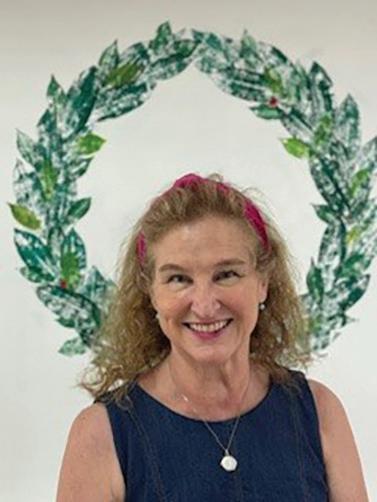
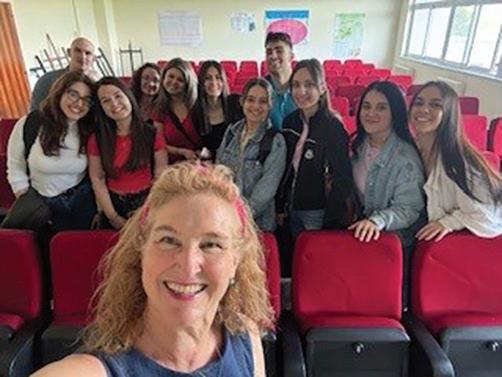


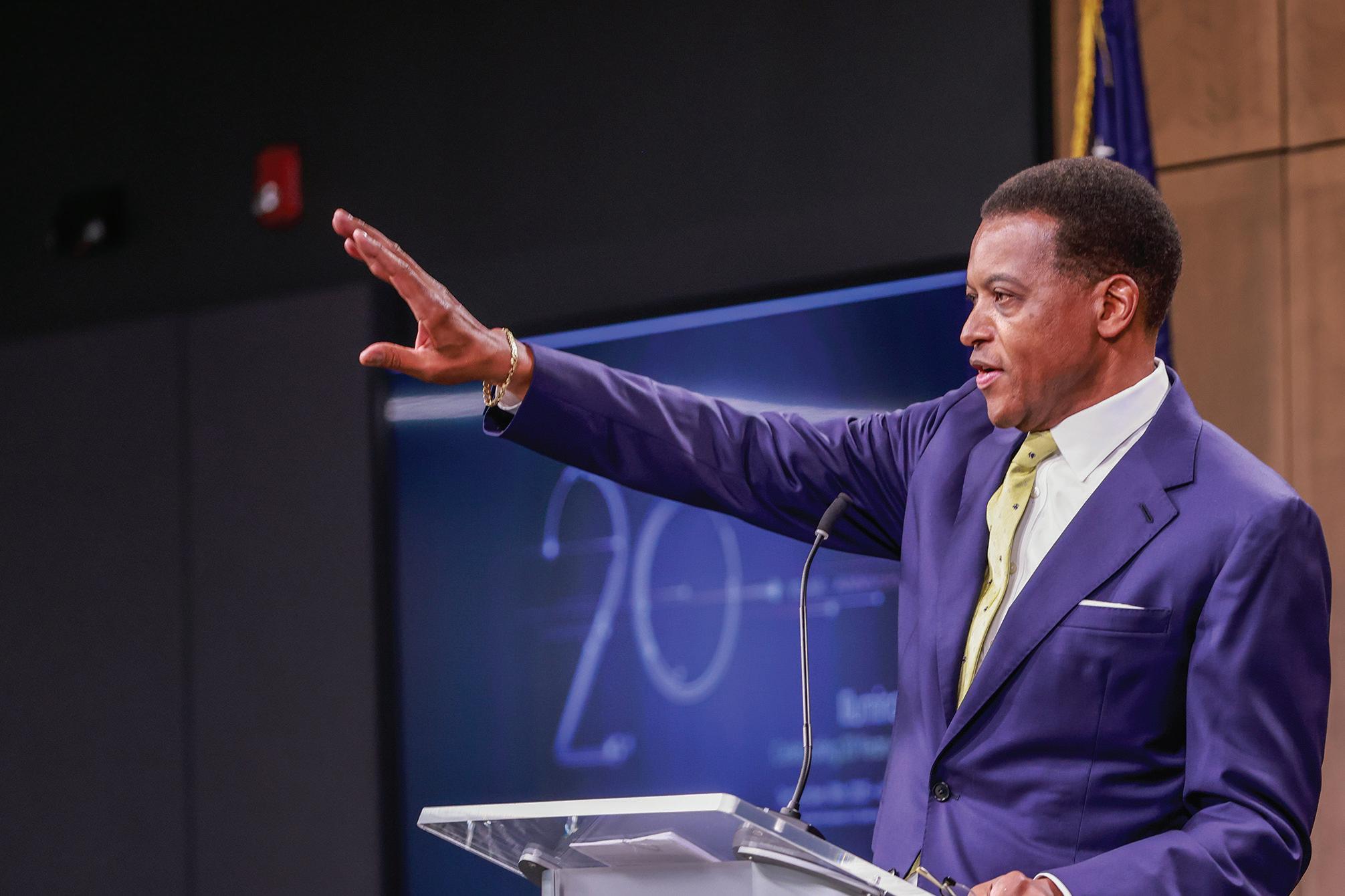
What would it take to connect rigorous research with the voices of Cleveland’s communities? For Randell McShepard (MSUS ’98), Board Chair of PolicyBridge, and Timothy Goler (MUPD ’02) the answer started at Levin College and was scribbled on napkins in the vending machine lounge and nurtured through late-night conversations between classes. Those early sketches sparked an idea: a local think tank that could turn research into action, bring new leaders to the table, and tackle Cleveland’s toughest challenges. From the start, Randy and Tim shared a vision of research that could directly improve their city.
Today, PolicyBridge continues that mission, with economic mobility for all Cleveland residents as its guiding “north star.” Its latest initiative, the Urban Agenda, exemplifies the organization’s collaborative approach, connecting city leaders, nonprofit and philanthropic partners, higher education representatives (including Levin College), and community members to address complex issues and advance sustainable growth across Northeast Ohio.
What started as casual conversations grew into a commitment to address local challenges and amplify voices often left out of policy discussions.
Early in their journey, Randy and Tim visited national think tanks in Washington, D.C., including the Brookings Institution. They realized that no think tank existed with the rigor, local focus, and applied impact they envisioned and were determined to fill. The need for new leaders at the table was urgent. Cleveland was climbing the list of the nation’s poorest cities, and lasting solutions required fresh voices and innovative approaches.
By 2005, PolicyBridge had formally launched, with Randy leading early efforts as Board Chair. Gregory L. Brown (MSUS ’04), then Executive Director of the Center for Community Solutions, a research center for health and human services in Ohio, served as the first board member. His research team was instrumental in developing PolicyBridge’s first report. In 2009, Greg transitioned into a staff role as PolicyBridge’s Executive Director. Under
his leadership, the organization grew into a research and advocacy hub, translating data and applied research into practical solutions across economic development, education, health and wellness, and workforce development.
While PolicyBridge has produced many reports, its mission has always gone beyond publishing. Guided by Randy’s north star of economic mobility, the organization is dedicated to turning research into real initiatives that create lasting impact in people’s lives.
The Rebuilding Blocks report, for example, highlighted systemic barriers facing Cleveland neighborhoods. When Randy’s childhood friend Keymah Durden challenged him—“You’ve written a great report, but what are you going to do about it?”—PolicyBridge responded by helping launch the Rid-All Green Partnership, a nationally recognized urban farm and training center in Cleveland’s Kinsman neighborhood. What began as a blighted dumping ground has been transformed into a thriving 18-acre campus that grows healthy food, raises thousands of tilapia each year, and hosts a weekly farmers market that brings fresh produce directly to the community. RidAll has become a hub for growing food, creating jobs, providing education, and fostering community connections, all directly contributing to expanded economic opportunity.
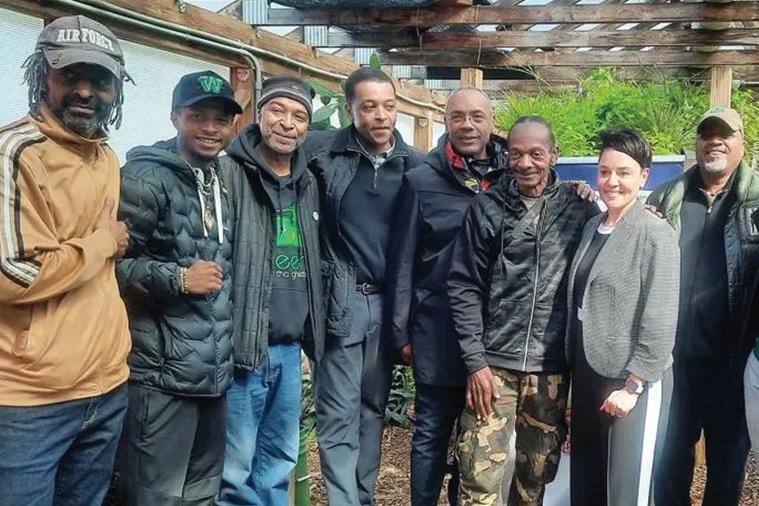

Similarly, the Education Pay$ campaign emerged from the 2007 Rap on Culture report, which documented negative cultural messages that undermined educational attainment. PolicyBridge designed a multi-channel marketing campaign including billboards, bus signs, radio, and digital outreach in an effort to replace discouragement with empowerment. The message was clear: Education is the surest path to long-term economic mobility. Dr. Mittie Davis Jones, Professor Emeritus and former Chair of Urban Studies at Levin College, served as evaluator, ensuring outcomes were measured and tied to meaningful improvements in educational achievement. Dr. Jones serves on the PolicyBridge board, strengthening the connection between the organization and the college.
Through these initiatives, PolicyBridge demonstrates that its work is actionoriented, community-driven, and guided by a singular goal: advancing economic mobility for all Cleveland residents. Reports, forums, and policy proposals are not just studies, but rather a starting point for partnerships, programs, and policies that reshape neighborhoods, lift families, and expand opportunities.
Randy McShepard, Vice President of Public Affairs and Chief Talent Officer for RPM International Inc., has been a constant presence at PolicyBridge as its co-founder and board chair. Over the past two decades, his blend of corporate leadership and community engagement, including his recent election as chair of the Cleveland Foundation, the world’s first community foundation,
demonstrates a sustained commitment to civic impact. His co-founder, Timothy D. Goler, Ph.D., has built a distinguished career as both a faculty member and policy leader. Under the day-to-day leadership of Gregory L. Brown, PolicyBridge continues to strengthen its capacity to translate data into real-world change while carrying forward Levin College’s applied learning model into practice.
PolicyBridge has released 21 research reports, two policy briefs, and has been a lead contributor and architect of HB 613, the Civilian Interaction Bill aimed at improving police/citizen interactions during traffic stops. Furthermore, PolicyBridge has hosted 26 community forums attracting 18,300 attendees, and provided testimony in Washington, D.C., and Columbus, Ohio. Its work has been featured by CNN, Black Enterprise, Associated Press, the Plain Dealer, PBS Ideastream, and The Call & Post.
The Urban Agenda, PolicyBridge’s current initiative, continues this approach. By convening city leaders, nonprofit and philanthropic partners, higher education representatives, and community members, it tackles complex urban challenges while keeping economic mobility for all at the center of every effort.
Levin College has played an integral role in PolicyBridge’s 20-year journey. Leadership, faculty, and staff contribute research, policy expertise, and guidance, while students and alumni gain firsthand experience seeing applied research influence policy. Most recently, Dean Jill Gordon represented CSU
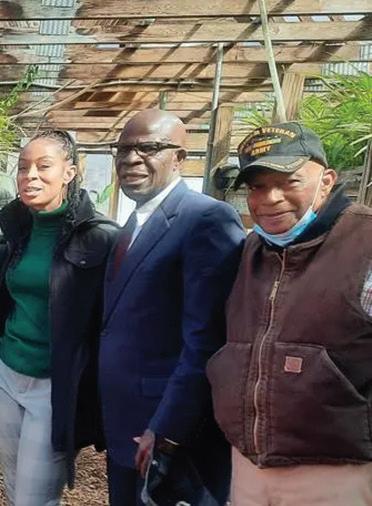
at the Urban Agenda kickoff and signed an MOU ensuring that Levin College and Cleveland State University remain key partners in the initiative.
Dean Gordon notes, “Levin College is proud to have been part of the PolicyBridge story from the very beginning. This partnership reflects our commitment to producing changemakers who serve their communities.”
At PolicyBridge’s 20th anniversary celebration, Dean Gordon accepted an award recognizing Levin College’s ongoing support of the organization. She shared the slogan “Changemakers Start Here,” proudly displayed on campus, reflecting the origin story and remarkable impact of PolicyBridge.
From napkin sketches to a regional hub for research and action, PolicyBridge has shown what’s possible when ideas, evidence, and community voices come together. Together, Levin alums Randy, Tim, and Greg have shaped policies, trained new leaders, and elevated the voices of Cleveland residents, proving that meaningful change happens when education, research, and civic engagement intersect. As Randy reflects, “It all began with a conversation and a shared belief that change is possible. Levin gave us the tools, the network, and the inspiration to make it real.”
Greg emphasizes, “Our mission has always been about translating knowledge into action. Our Levin roots taught us that research is only powerful when it informs real change.”


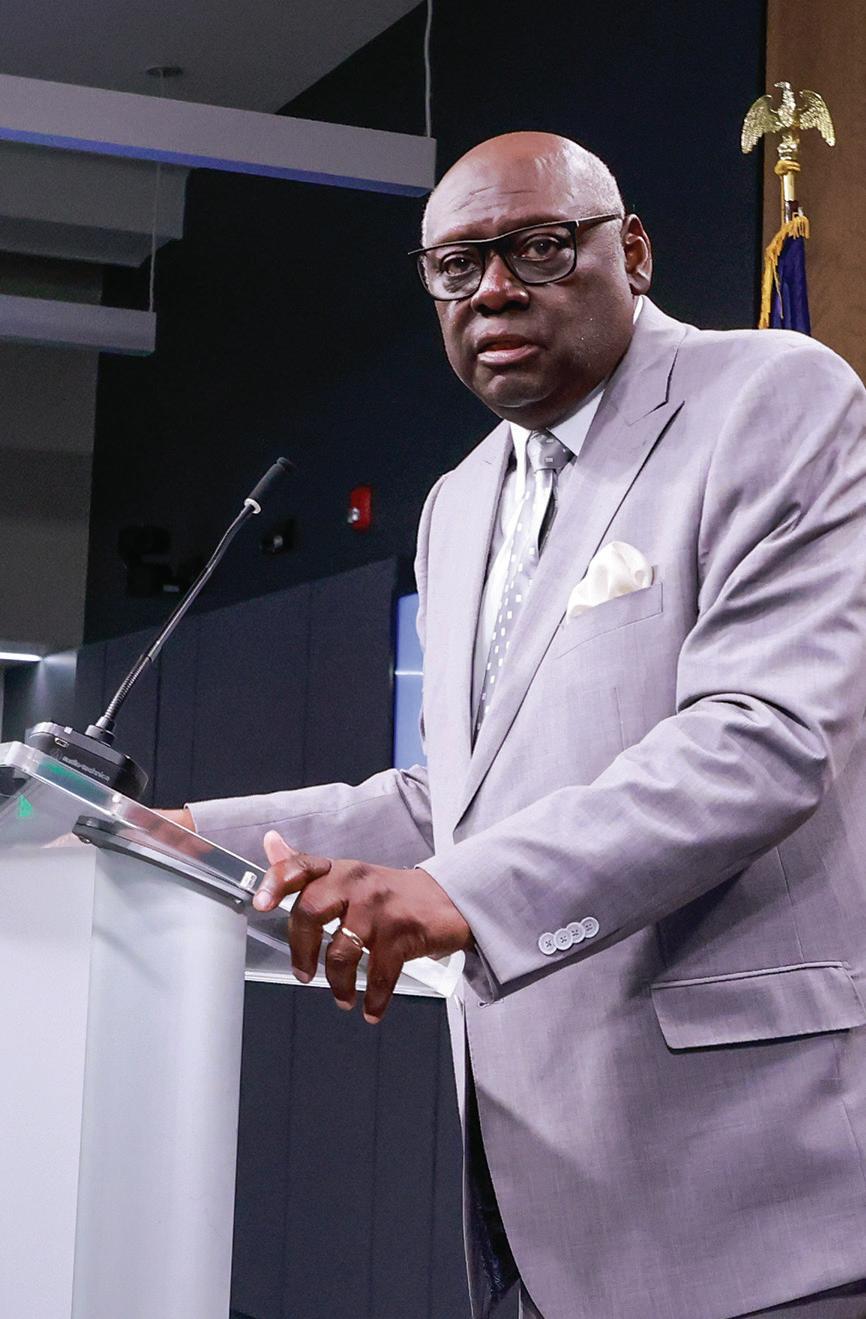
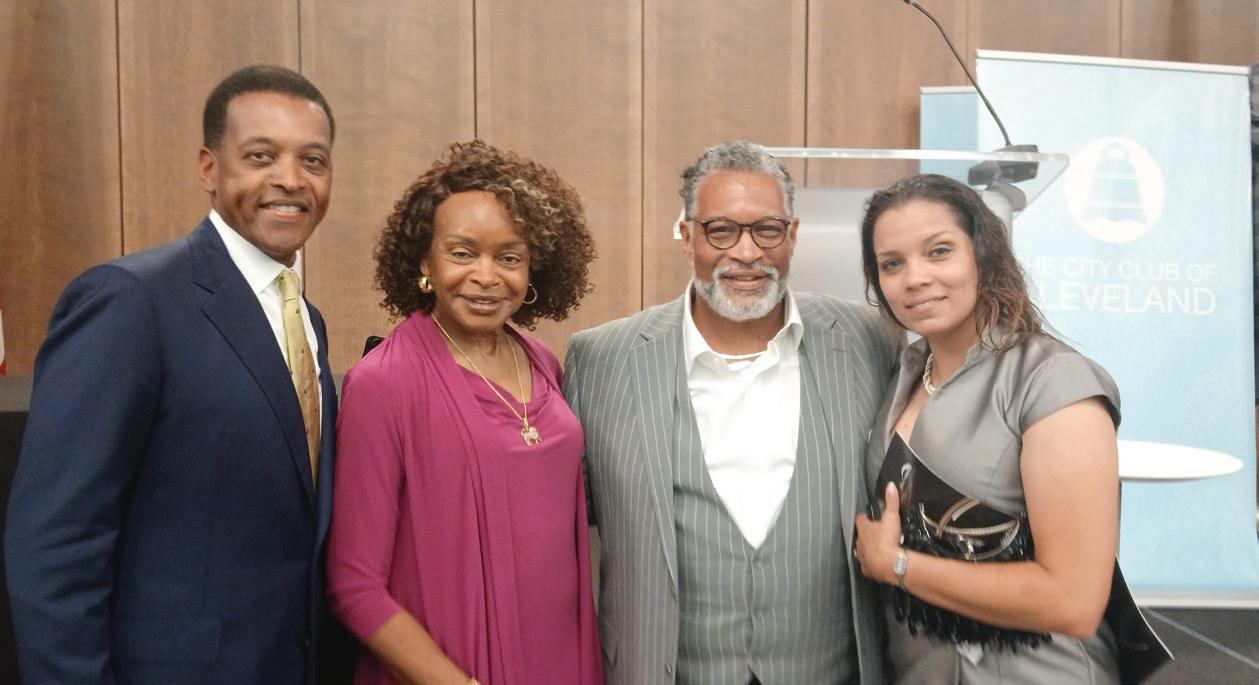
Scan here to watch a video of the 20th anniversary:

The passage of House Bill 29, ending driver’s license suspensions for unpaid fines and fees in Ohio, highlights the role of applied research in advancing policy solutions. Dr. Brian Mikelbank, associate professor in the Maxine Goodman Levin School of Urban Affairs, contributed key research that deepened understanding of the economic and social costs of these suspensions.
Dr. Mikelbank coauthored two research reports as part of this effort. The first, Road to Nowhere: Debt-Related Driver’s License Suspensions in Ohio, illuminated the scale of the problem in Ohio: more than three million debtrelated suspensions every year, more than $900 million dollars in outstanding debt, with impacts concentrated in Ohio’s poorest and non-white zip codes. In a second study co-authored with Levin alum Dr. Kyle Fee, Providing Labor Market Context for Debt-Related Driver’s License Suspensions in Ohio, the researchers estimated that in 2020 more than 830,000 people were unable to legally drive to work due to debt-related suspensions. Meanwhile, job postings requiring a valid driver’s license rose from 8 percent in 2015 to 14 percent in 2022, creating a compounding barrier to employment.
“This wasn’t just a transportation issue. It was an economic one,” said Dr. Mikelbank. “Debt-related suspensions were trapping people in cycles of unemployment and instability because in most Ohio communities taking away a driver’s license means taking away the mobility necessary to navigate your everyday life.”
Working in close collaboration with community partners like the Legal Aid Society of Cleveland, the Ohio Poverty Law Center, Neighborhood Connections, and Towards Employment, Dr. Mikelbank helped translate research into action. These partnerships provided the advocacy muscle and policy expertise needed to move reform forward.
That collective effort culminated in House Bill 29, sponsored by Representatives Latyna Humphrey (D-Columbus) and Darnell Brewer (D-Cleveland), which was signed into law by Governor Mike DeWine on January 8, 2025. The law took effect on April 9 and was fully implemented by the Ohio Bureau of Motor Vehicles one month later.
For Levin College, HB 29 is a milestone in its mission to connect research with real-world outcomes. “Our work is designed to drive change,” said Dean
The early results are striking:
429,501 suspensions removed
Over
$8.3 million in fees forgiven
170,000 Ohioans impacted, including: 7,076 who now have valid licenses
24,356 who are newly eligible to test
Jill Gordon, Ph.D. “This legislation shows how data and collaboration can inform policy and improve lives.”
For Dr. Mikelbank, it is a powerful reminder that when research is rooted in public service, it can truly move the needle.
Scan the QR codes to the research reports
Left: Road to Nowhere: Debt-Related Driver’s License Suspensions in Ohio
Right: Providing Labor Market Context for Debt-Related Driver’s License Suspensions in Ohio
For Dr. Rob Kleidman, meaningful dialogue, especially the kind that builds trust and sparks change, is central to developing leaders and strengthening society. This belief guides his work at Cleveland State University, where he is a founding core team member of the Community Organizing Journal, co-sponsored by Levin College of Public Affairs and Education, and serves as Faculty Athletics Representative (FAR).

Dr. Kleidman never expected his background in community organizing to shape his path in collegiate athletics. Nearly 20 years ago, he connected with former CSU Men’s Basketball Coach Rollie Massimino, whose team was struggling with communication. Kleidman introduced one-on-one conversations—a core organizing tool—to help players build trust and understanding.
That simple idea evolved into his Sociology of Sports class and role as Faculty Athletics Representative, where he now applies organizing principles across classrooms, teams, and community partnerships to strengthen leadership, communication, and collaboration.
Kleidman’s academic path reflects his interdisciplinary lens: he majored in psychology at Cornell, earned a master’s in education at UC Berkeley, and completed a Ph.D. in sociology at the University of Wisconsin, focusing on social movements. His dissertation on American peace campaigns was later published as a book.
Arriving at CSU in 1989, he became involved with Cleveland’s rich tradition of community organizing, leading projects that built bipartisan coalitions to tackle housing, education, land use, and economic development challenges— with strong support from the university.
Dr. Kleidman, a sociology instructor at Levin College, teaches students the principles of community organizing through building relationships, fostering accountability, and creating collaborative, action-oriented cultures. These lessons extend beyond theory, providing important skills to prepare students to step into careers in the public, private, and nonprofit sectors.
Paige Ray, BA ’24, summa cum laude, first took Dr. Kleidman’s Sociology Capstone course as an undergraduate and now studies in Levin’s Master of Urban Planning and Development program.
“He shows compassion to all of his students,” Ray said. “His course was very important in helping me practice active listening. He never failed to make his students feel heard as well.”
Beyond the classroom, Dr. Kleidman adapted community organizing principles into leadership workshops for student-athletes, following his appointment as FAR. Beginning with relationship-building and later focusing
on accountability, these sessions serve 40–50 student-athletes annually, strengthening leadership, communication, and team cohesion. “These conversations, while commonly seen as difficult, are valuable,” Kleidman said. “We can build a culture where we believe we owe it to each other to intervene when we see things that could be going better.”
Recognizing the gap in scholarly publishing, Kleidman joined five other academics and practitioners to create the Community Organizing Journal. Together, they formed a core team, developed a mission, recruited an editorial board, and issued a call for papers, attracting high-quality submissions from both scholars and practitioners.
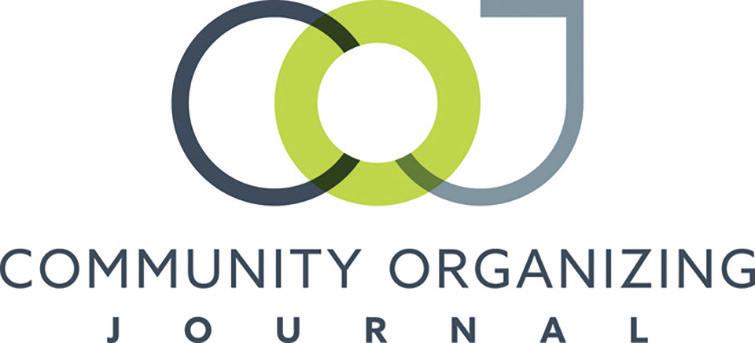
Co-editing Issue 1 with Dr. Margaret Post of Clark University, they implemented a collaborative review process that provides early feedback and dialogue before traditional blind peer review, supporting emerging scholars and practitioners while ensuring rigor.
The inaugural issue, published in March 2025, explores topics from urban power-building to digital strategies and community-based research, sparking international dialogue. Co-sponsored by CSU’s Levin College and Clark University, the journal underscores Levin’s role in advancing scholarship and practice at the intersection of community organizing and urban policy.
“I am grateful to Dean Jill Gordon and the Levin College of Public Affairs and Education for the continued support of our journal,” Kleidman said. “There’s always been great support from CSU for many organizing projects, and Levin has been particularly supportive of this Journal. It offers a forum for scholars and organizers to reflect together on the state of organizing and how we can build together to be impactful.”
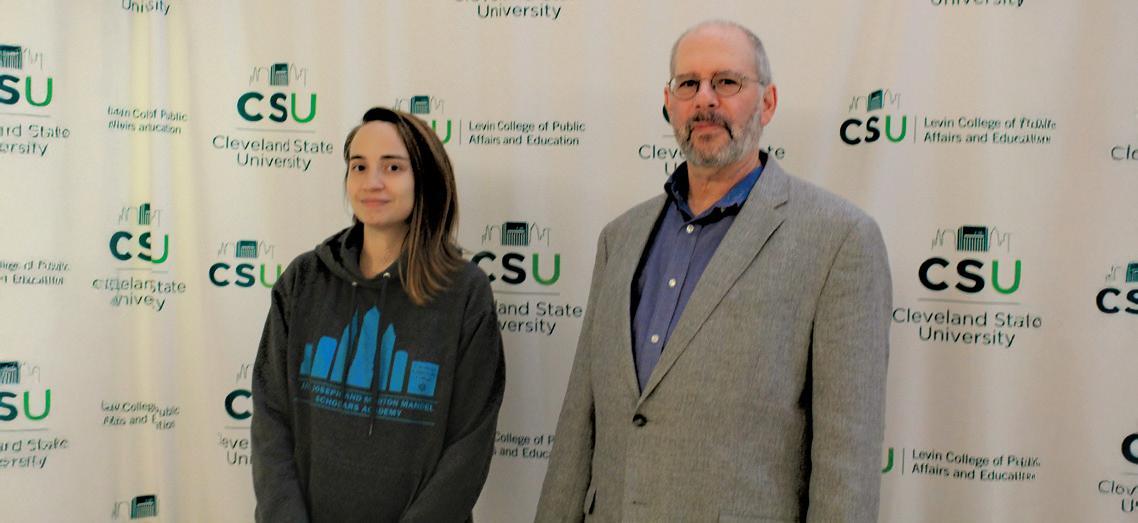
If experience is the best teacher, Levin students in the Digital Content Production minor got a master class— working directly with the City of Cleveland to make an impact on real community projects.

“Like most major cities, Cleveland is underfunded,” said Dr. Beth Thomas, Associate Lecturer in the School of Communication at Levin College. “A small team is responsible for telling the city’s stories and highlighting community projects. That’s where our students step in.”
The collaboration began when a student speed networking event introduced Dr. Thomas to Fatimah Harris, communications strategist in the Office of Cleveland Mayor Justin Bibb. This partnership provided students with the opportunity to build professional portfolios while contributing to under-resourced areas of city government and local nonprofits.
Levin students worked in groups to create digital content across five areas for the City of Cleveland: Cleveland Police, Historical Cleveland Landmarks, Cleveland’s Climate Action Plan, Southeast Side Promise, and Cleveland Recreation Centers. They captured photos and videos, conducted interviews, and produced materials tailored to each client’s needs—creating everything from social media reels and infographics to posters and flyers using tools like Adobe and Canva.
Each semester, public relations and digital content production students turn classroom learning into community impact—partnering with local organizations to lead real-world communication initiatives.
Students developed a full strategic communication plan and created digital content, including social media posts and videos, to raise awareness, recruit volunteers, and increase donor support. The experience gave students professional pathways while enriching their personal connection to community service.
Want to see the impact firsthand? Scan the code to watch a student story on the capstone project.
Students produced photos, videos, and promotional campaigns to highlight adoptable dogs, boost volunteer engagement, and support adoption rates at Cleveland’s open-intake city kennel.
Check out a past student produced campaign here:
“This was a real-world experience that gave us a different side of public relations,” said Jane Matousek, a triple major in communications, journalism, and public relations. “The entire community was our client. We gained an understanding of how to communicate with professionals in real life and put everything we’ve learned into practice.”
Sergeant Wilfredo “Freddy” Diaz of the Cleveland Police praised the students’ professionalism: “The impactful work our officers do far outweighs any negativity. The students showcased remarkable organizational skills and dedication.”
Dr. Thomas highlighted the broader value of the capstone: “Students learned not just technical skills, but how to collaborate, communicate, and create meaningful change in the city.”
The Digital Content Production minor is open to students from across the Cleveland State campus, reflecting Levin College’s commitment to interdisciplinary learning and real-world engagement.
Through the Digital Content Production minor, Levin students step beyond the classroom and into the city itself. They create content that shares Cleveland’s stories, supports community initiatives, and contributes to projects that truly matter. Along the way, they see firsthand that communication is more than a skill—it’s a way to make a meaningful difference in the lives of people and neighborhoods around them.
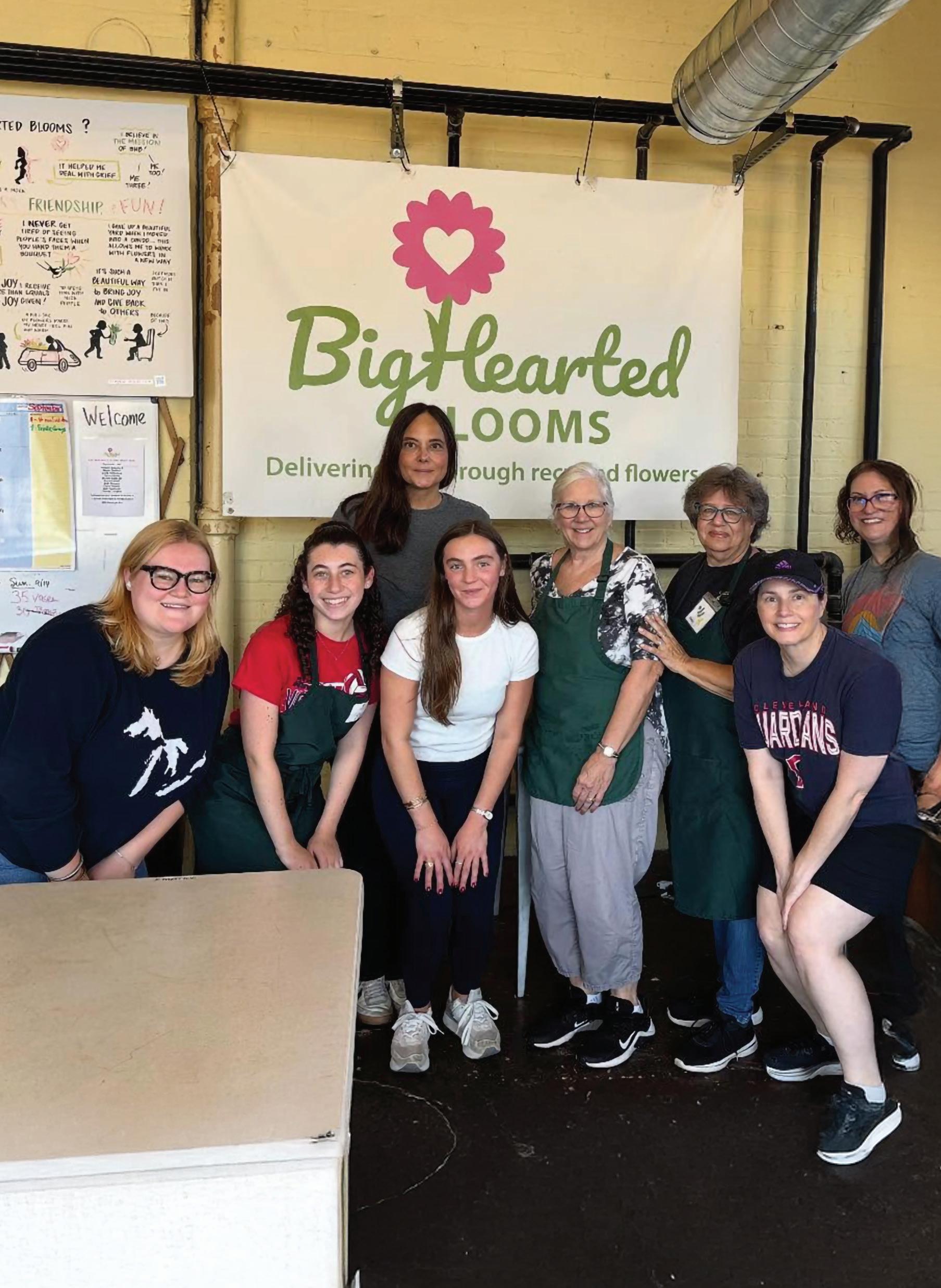
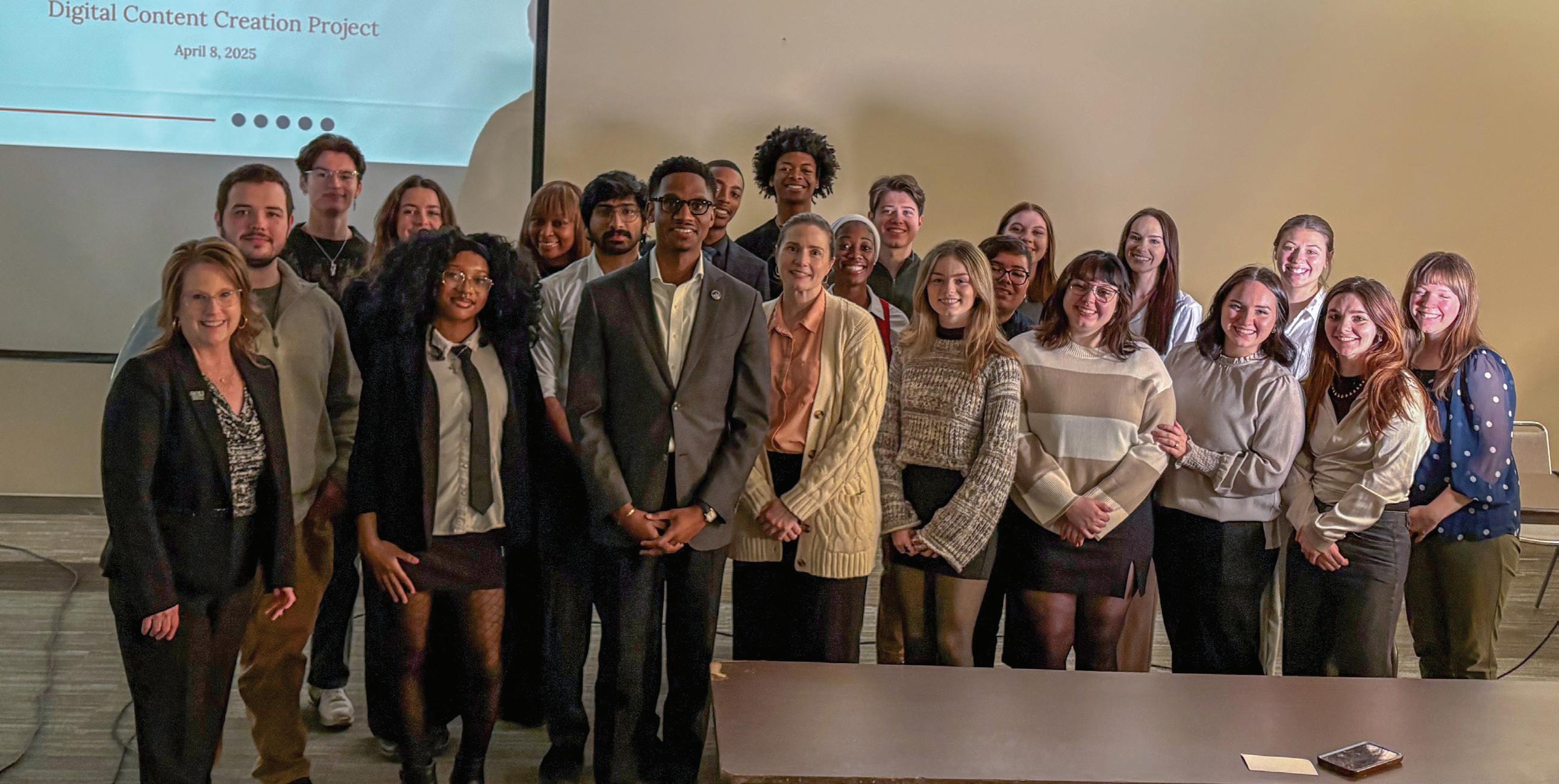

Sara Continenza (MPA, Nonprofit Administration Certificate, Cleveland State University ’14), Founder and Executive Director of Food Strong, believes food is more than nourishment—it’s the foundation of resilient communities. Her lessons began at home, where her father, a Great Depression survivor, taught her to garden, forage, and value fresh food. After earning her undergraduate degree, she served in the Peace Corps in West Africa and taught English in Japan before returning to Cleveland to address local food insecurity. From rural villages to urban neighborhoods, she witnessed the same challenge: access to healthy, fresh food is never guaranteed.
Today, Sara leads Food Strong, building sustainable food systems through school gardens, vacant lot restoration, mobile health and food caravans, and plans for a permanent food education hub on her farm. The nonprofit promotes food sovereignty through programs that emphasize cultivation, nutrition, wellness, and entrepreneurship.
Since 2016, Food Strong has partnered with the Cleveland Metropolitan School District to guide students at over a dozen public schools in designing, planting, and harvesting fresh food and flower gardens. These weekly or bi-weekly programs are rooted in Ohio’s Learning Standards and emphasize STEAM skills, entrepreneurship, environmentalism, social-emotional learning, and community development.
Students become Fresh Food Ambassadors teaching peers how fresh foods can be medicine for the body. They learn to cook healthy meals from scratch using garden harvests, participate in hands-on nutrition and culinary arts lessons, and even use a blender bike to make smoothies and soups—bringing fun and
excitement to healthy eating. Food Strong also offers affordable cooking classes tailored to the needs of schools and community organizations.
The Learning Garden at the Coit Road Farmers Market, developed in response to pandemic-related school closures, provides a safe outdoor classroom where students grow, create, and sell produce while building business skills. Local artists collaborate with students to design and paint foodfocused murals that beautify neighborhoods and promote awareness—funded by Cuyahoga Arts and Culture.
One of Food Strong’s most dynamic youth programs is Fresh Camp, a summer experience held at the Learning Garden and Coit Road Farmers Market in East Cleveland. In partnership with Refresh Collective and supported by sponsors like The Garden Club of Cleveland, United Way of Greater Cleveland, and The Cleveland Foundation, Fresh Camp blends music, nature, leadership, and nutrition. Students build social skills, learn about healthy eating, and create original rap songs inspired by their experiences in the garden.
Willson Elementary (CMSD) students are getting their hands in the soil and learning about healthy living through their partnership with Food Strong and the school’s flourishing garden.

John Adams High School: Fresh Food, Fresh Beats
Students at John Adams High School grow produce, explore nutrition, and— through a partnership with Refresh Collective—transform their ideas into music, art, and advocacy for wellness and opportunity.
Scan the QR code to see John Adams students’ original performance and hear directly from the next generation of leaders.
Sara credits her Levin experience with shaping her career in public service. In her first class, Dr. Larry Keller’s Introduction to Nonprofits, she learned that success in public affairs isn’t just about what you know, but who you know. A class assignment to interview the director of the Hunger Network led to her first job in food security. Courses with faculty like Dr. Nick Zingale deepened her understanding of urban policy.
“Sara has the ability to inspire those around her,” says Dr. Zingale. “She demonstrated this in class and continues to do so through her work creating self-reliant communities and empowering others.”
Networking at Levin also had a lasting impact. Sara met Randell McShepard (MPA ’90), Board Chair of PolicyBridge and this issue’s Levinspiration, when he spoke in her class. His work in urban agriculture, composting, and aquaponics inspired her approach to Food Strong. McShepard is now a key partner in community gardens, mobile food and health initiatives, and other sustainability projects across Cleveland neighborhoods. See his full feature as our Levinspiration elsewhere in this magazine.
Sara’s leadership extends into public service as a South Euclid City Council member, a role she has held since 2017. She champions youth programs, backs local businesses, and drives neighborhood development, applying the skills she honed at Levin College to create initiatives that strengthen the community and improve daily life for residents.
“This work isn’t just about food—it’s about building stronger, more resilient communities,” Sara says. “Giving people the tools, knowledge, and opportunities to shape their neighborhoods benefits everyone.”
Sarah Continenza, MPA ’14, Founder and Executive Director of Food Strong and South Euclid Councilwoman, credits Levin College with helping her build the network and skills to serve her community.
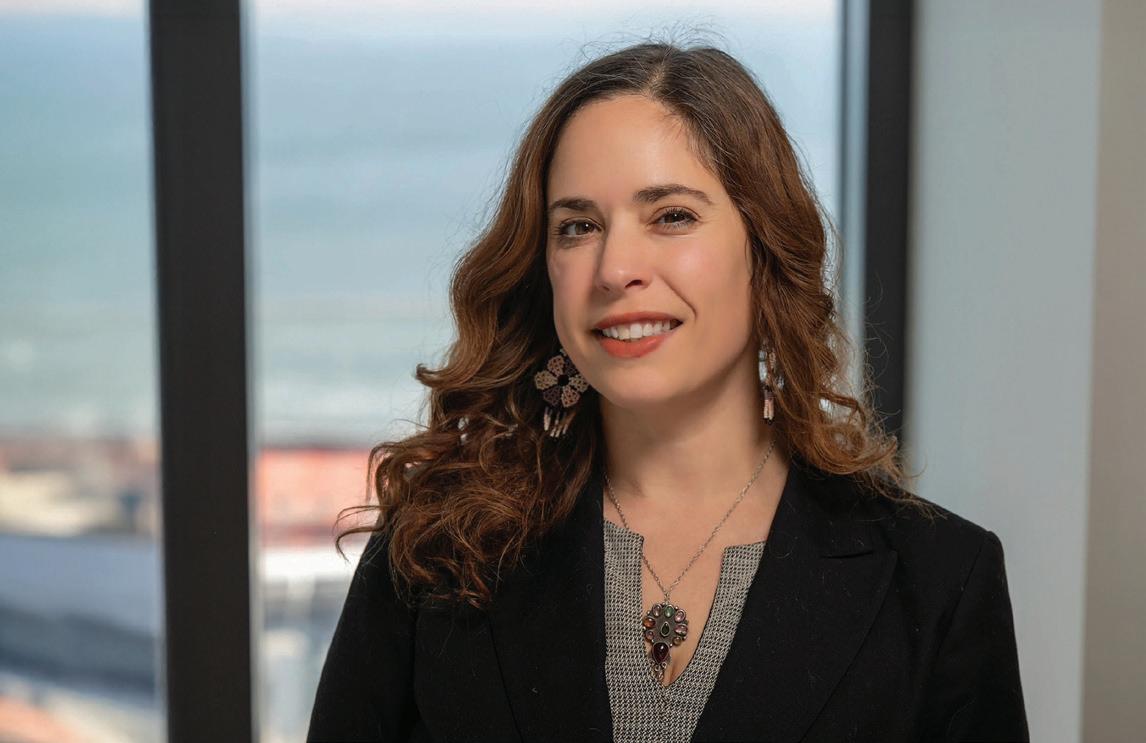
That vision is now taking root at Superior and 67th, where Food Strong has been gifted a nearly three-acre site that includes a farmhouse, former church, gardens, and hoop houses. Over the next five years, the property will be transformed into an urban farm and community hub offering fresh food production, volunteer housing, vocational and entrepreneurial training, wellness services, and cultural and recreational gathering spaces.
The Superior Farm Fixup reflects what Sara learned at Levin: how policy, partnership, and hands-on leadership come together to create lasting impact. By turning a once-vacant property into a center for health, learning, and opportunity, Sara and her team are not only growing food—they’re growing resilience, equity, and possibility for Cleveland’s neighborhoods.

The way we work has changed forever. Virtual work and shifting career patterns have created a once-in-a-generation opportunity for public agencies to strategically grow their leadership and build stronger pipelines for the future. Rob Ziol, Director of the Center for Public and Nonprofit Management (CPNM), emphasizes the potential of this moment: “We have a chance to rethink what public servants want and what their agencies need and create programs that have real impact. The Ohio Certified Public Manager® (OCPM) connects professional development to CSU academic pathways, equipping the next generation of leaders with the skills, experience, and confidence to step into critical roles.”

Starting as a Graduate Assistant at Levin while earning his MPA, Rob understands the demands on students balancing coursework, careers, and professional growth. Today, he leads CPNM’s professional development, mentoring, and applied research programs and directs the Certified Public Manager program for the State of Ohio. With decades of experience building partnerships across public agencies, Rob has a deep understanding of how organizations cultivate talent and leadership and is passionate about turning those insights into programs that deliver meaningful results.
Through a deep partnership between the Center for Public and Nonprofit Management and faculty from the Maxine Goodman Levin School of Urban Affairs, led by Dr. Clayton Wukich, OCPM has been reimagined as more than just professional development. Together, Rob Ziol and Dr. Wukich envisioned and implemented a pathway that allows participants to earn academic credit, apply prior experience, and accelerate their careers. Drawing on Rob’s expertise in workforce partnerships and Dr. Wukich’s leadership in shaping the program’s academic framework, the collaboration connected professional development with academic advancement, ensuring participants gain both practical skills and recognized credentials.
“We saw an opportunity to bridge real-world learning and academic growth in a way that directly serves Ohio’s public workforce,” said Rob Ziol. “Through deep collaboration with Levin faculty, we created a model that recognizes experience, builds confidence, and opens doors for career advancement.”
“By connecting OCPM to our academic programs, we provide a pathway that recognizes the expertise public servants already have and helps them translate that experience into degrees,” said Stephanie Ryberg-Wester, Interim Director of the Maxine Goodman Levin School of Urban Affairs. “This approach not only accelerates academic achievement but also strengthens leadership capacity across the state.”
Next year, the OCPM program will train its 1,000th participant, a milestone that reflects not just its statewide reach, but the real impact of a pathway that helps public servants turn their experience into recognized credentials, build confidence, and step into leadership roles that strengthen communities across Ohio.

As a member of the Executive Committee and Board of the National Certified Public Manager® Consortium and its Treasurer, Rob Ziol helps shape national standards for leadership development. He supports communities across the country as they launch new CPM programs, advancing public service leadership in communities from coast to coast.
Participants can earn CSU academic credit through OCPM and may also apply AAPLE (Advanced Academic Prior Learning Evaluation) credit for prior professional experience. This reduces the number of courses needed, saves money, and accelerates degree completion.
Since 2023, Levin’s partnership with Ohio University and the Voinovich School of Leadership and Public Service in Dublin, Ohio has expanded OCPM’s capacity to reach and serve more communities across Ohio. Together with additional state and local initiatives, these efforts position OCPM as a leading force for workforce development, leadership succession, and employee retention statewide.
• A pipeline, not a detour: Participants earn CSU academic credit, and AAPLE credit for prior experience can accelerate degree completion.
• Real-world impact: Capstones and applied learning bring immediate value to organizations.
• Employer investment: Agencies see OCPM as a workforce development opportunity that strengthens teams—not just individuals.
• Strategic partnerships: Collaborations with state and local organizations position OCPM as a vital tool for leadership development, succession planning, and employee retention.
• Statewide access: Partnerships with Ohio University and entities like the Ohio Department of Natural Resources expand OCPM’s reach and foster connections across agencies and communities.
Levin College is committed to creating an innovative and collaborative pathway that helps Ohio’s public servants build on the experience and knowledge they already bring. Through programs like OCPM, participants transform that expertise into academic credit, leadership skills, and projects that strengthen their communities and advance public service across the state.
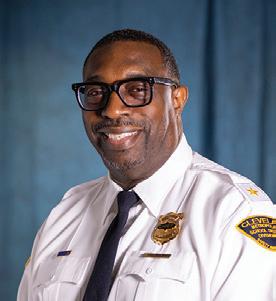
Starting as a part-time security officer in 1996, Dodson advanced steadily in his career while connecting to CSU through LeanOhio Boot Camp and OCPM. He introduced an electronic permitting system for the Cleveland Metropolitan School District that cleared years of paper backlogs. Along the way, he earned two associate degrees and is now pursuing a bachelor’s in public safety management at CSU. Dodson has also sent 25 team members through OCPM.
“I 100 percent believe that had I not taken the Leadership Academy and Public Management Academy, I wouldn’t have gone forward with completing my first degree. It reignited my learning spirit.”

With nearly 40 years in municipal government, Siwierka completed both the Public Management Academy and Leadership Academy, earning CSU academic credits through OCPM. In 2024, she graduated with her Master of Public Administration, earning straight A’s and gaining firsthand policy experience in the Columbus Seminar.
“The OCPM program is fantastic. It can push you to that promotion, get you to that next level. Many mid-level managers can make the transition to decision-making leadership roles with access to the right toolkit.”
Build on your OCPMA for academic advancement:
• Bachelor’s Degree in Public Safety Management
• Bachelor’s Degree in Urban Studies
• Master of Public Administration (MPA)
Your pathway from professional training to advanced education-creating leaders who make a difference in Ohio’s communities.
Scan the QR code to see examples of experiential learning through OCPM Capstone Projects
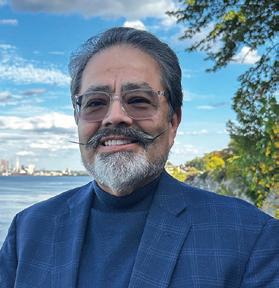
Eduardo Romero’s introduction to Levin through the Lean Six Sigma Boot Camp sparked his vision to strengthen the pipeline between Levin College and City Hall to prepare the next generation of public leaders. As Commissioner of the Division of Risk Management, he witnessed a major shift in workforce expectations.
“Applicants wanted to know what the city could offer them to be competitive in the job market,” he explained. “They wanted a three-to-five-year plan for skillset enhancement so they could pursue their next position. It was an eye-opening change in culture.” Romero sees CSU not just as a resource for students, but as a vital partner to the city—helping cultivate talent, expand leadership capacity, and ensure Cleveland is ready to thrive in the future.
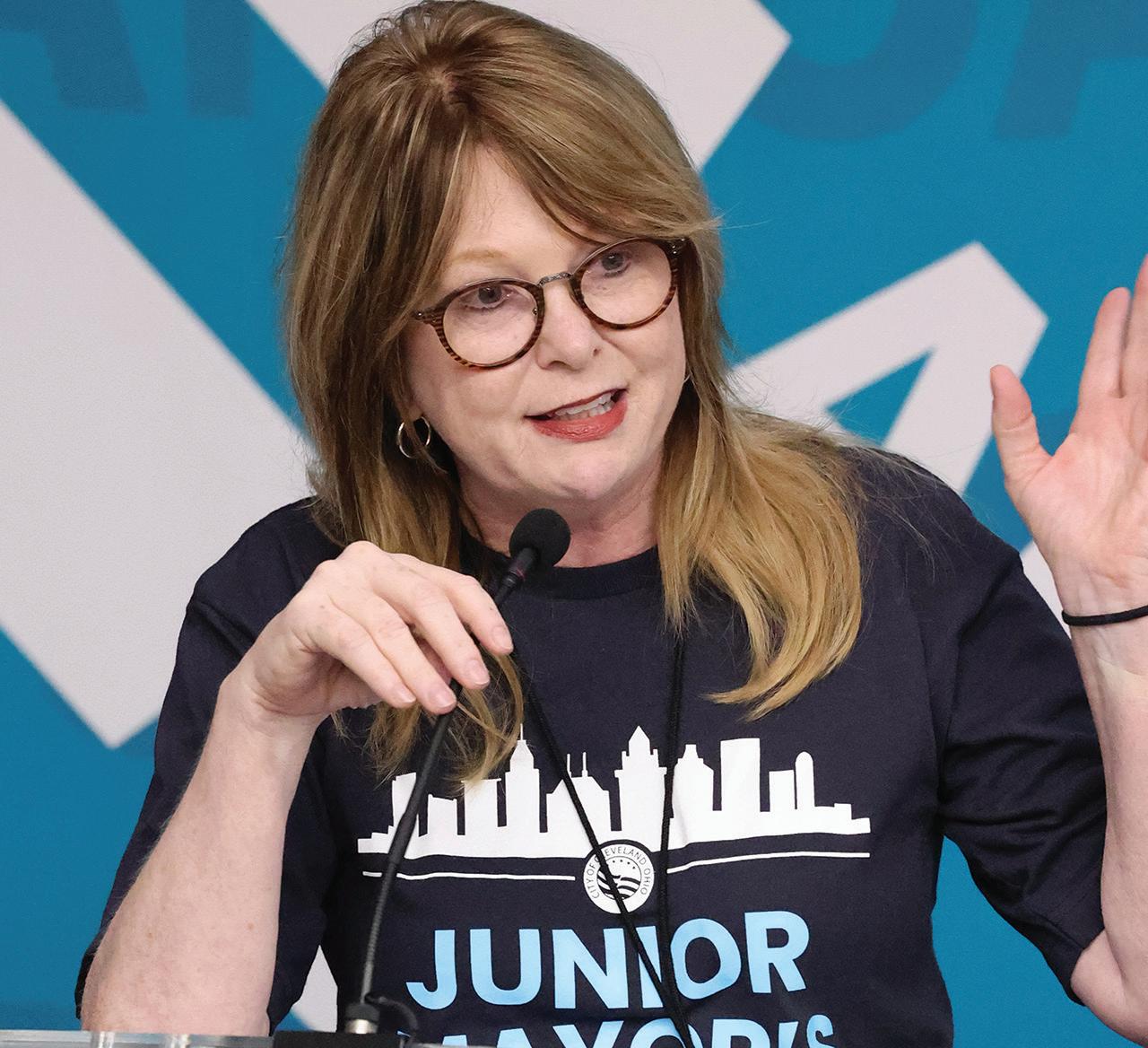
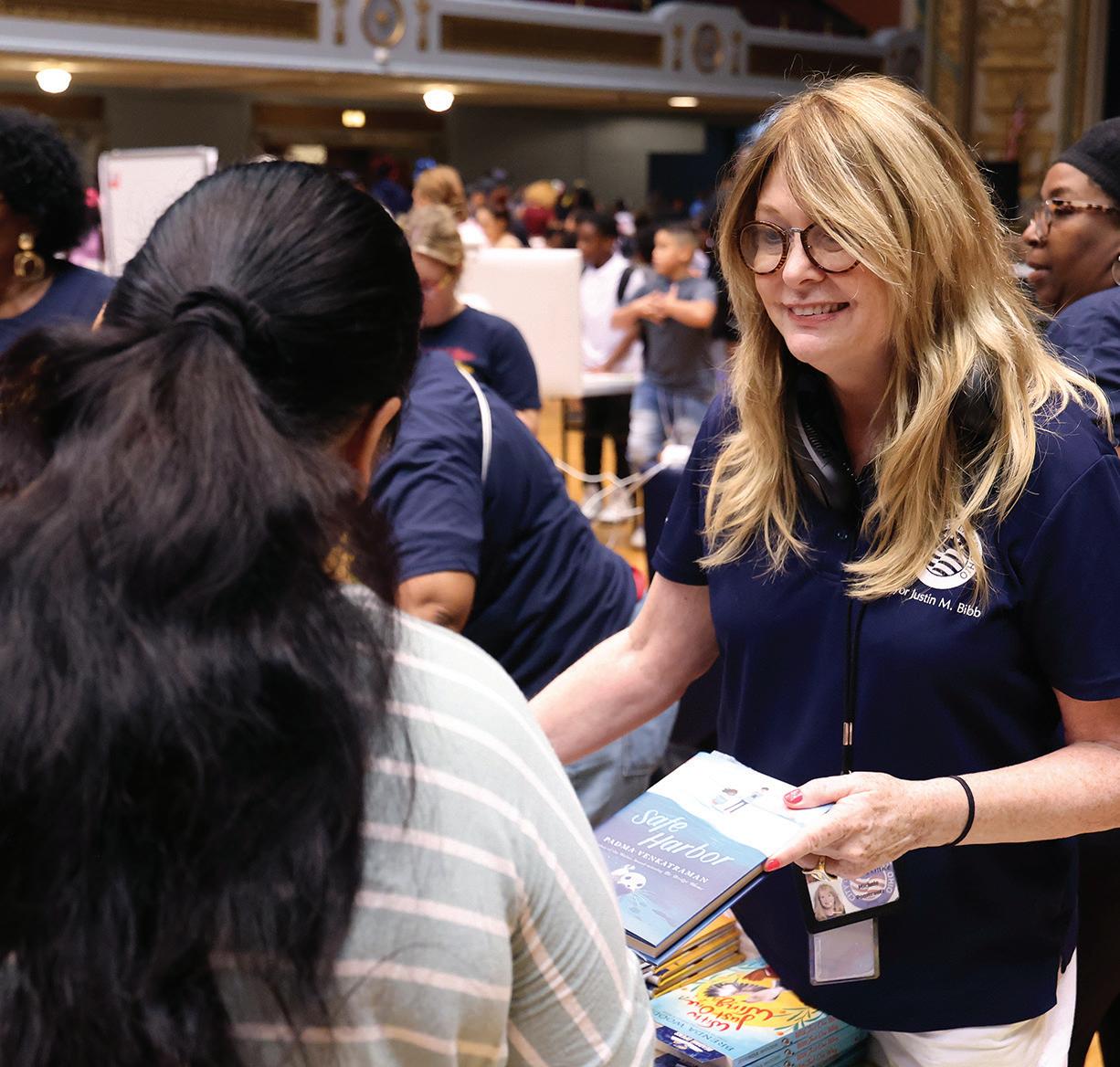
“I have had the opportunity to help shape education policy on a local, state, and national level—and I owe my success to Cleveland State University!” says Michele Pomerantz, City of Cleveland’s Chief for Education Policy.
For Michele, education has always been more than a career—it’s a deeply held calling to nurture growth, influence public policy, and build stronger communities where every resident has the chance to thrive. For over 30 years, she has dedicated herself to ensuring students receive the support, resources, and opportunities they need to succeed, while working behind the scenes to craft the policies that make those successes possible.
Her journey began at CSU, where she earned her bachelor’s degree in elementary education in 1984 and her master’s in curriculum and instruction in 1995. As a first-generation college student and single mother, Michele faced the daunting challenges of balancing parenting, work, and academics—even bringing her baby to class when childcare was unavailable. Through it all, CSU’s scholarships, flexible course schedules, and close-knit community provided the support she needed to persevere. This encouragement empowered her to graduate as Student Teacher of the Year and step confidently into her first-grade classroom in the Cleveland Metropolitan School District (CMSD).


Levin alumna Michele Pomerantz’s leadership on the Cleveland Plan shows how our alumni help shape policy and drive meaningful change in the city’s schools. With three CMSD schools on CSU’s campus, Levin serves as a training ground for future educators and a close partner with the district, connecting students and alumni to the organizations shaping Cleveland’s future.
Two decades in the classroom gave her a front-row seat to the realities facing teachers and students. In 2008, she became Director of Political Action for the Cleveland Teachers Union, where she played a major role in shaping the Cleveland Plan—an ambitious set of reforms aimed at giving high-performing schools more flexibility, creating innovative school models, holding all schools accountable, and securing new funding through a voter-approved levy. When tensions between city leaders and the teachers’ union threatened to derail both the plan and the levy, Michele helped broker a compromise that kept students at the center of the conversation.
Her leadership took her to Washington, D.C., as Deputy Director in the American Federation of Teachers’ Office of the President, and then back to Cleveland as Senior Advisor to CMSD serving under the former CEO Eric Gordon, where she helped implement the Cleveland Plan and pass three successful school levies. She later served as Director of Regional Collaboration for Cuyahoga County, working with 59 mayors and city councils, and held a government relations role with MetroHealth System.
In 2023, Mayor Justin Bibb tapped Michele to serve as Cleveland’s Chief for Education Policy, a role she calls the culmination of her work in both education and government. Since then, she has been a driving force in advancing the city’s literacy initiatives, including Mayor Bibb’s Science of Reading Summit, hosted at CSU’s Levin College in fall 2024. The event
brought together educators, researchers, policymakers, and community leaders to focus on evidence-based reading instruction that can transform literacy rates for Cleveland’s students. Levin’s role as host highlighted the college’s mission by connecting scholarship, policy, and practice to prepare the next generation of educators and leaders.
Levin is also collaborating with Michele’s office on the Junior Mayor’s Association, which introduces students to City of Cleveland departments, leaders, and initiatives. Through hands-on activities and capstone projects, students explore real-world challenges, develop innovative solutions, and present them to City leadership. The program fosters leadership, teamwork, and problem-solving skills while building stronger connections between students, city leaders, and community partners.
For Michele, the summit and programs like Junior Mayor’s Association are not just events but examples of what is possible when schools, city government, and higher education work together. “We’re not just addressing today’s challenges,” she says. “We’re building the foundation for tomorrow by making sure our students are learning the skills they need to succeed in school and in life.”
Today, Michele is exactly where she is meant to be, bringing people together, aligning resources, and advancing policies and initiatives that help Cleveland’s young people thrive.
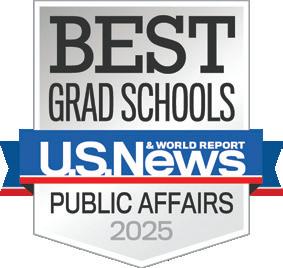
RANKED #4 in Urban Policy
RANKED #12 in Local Government Management
